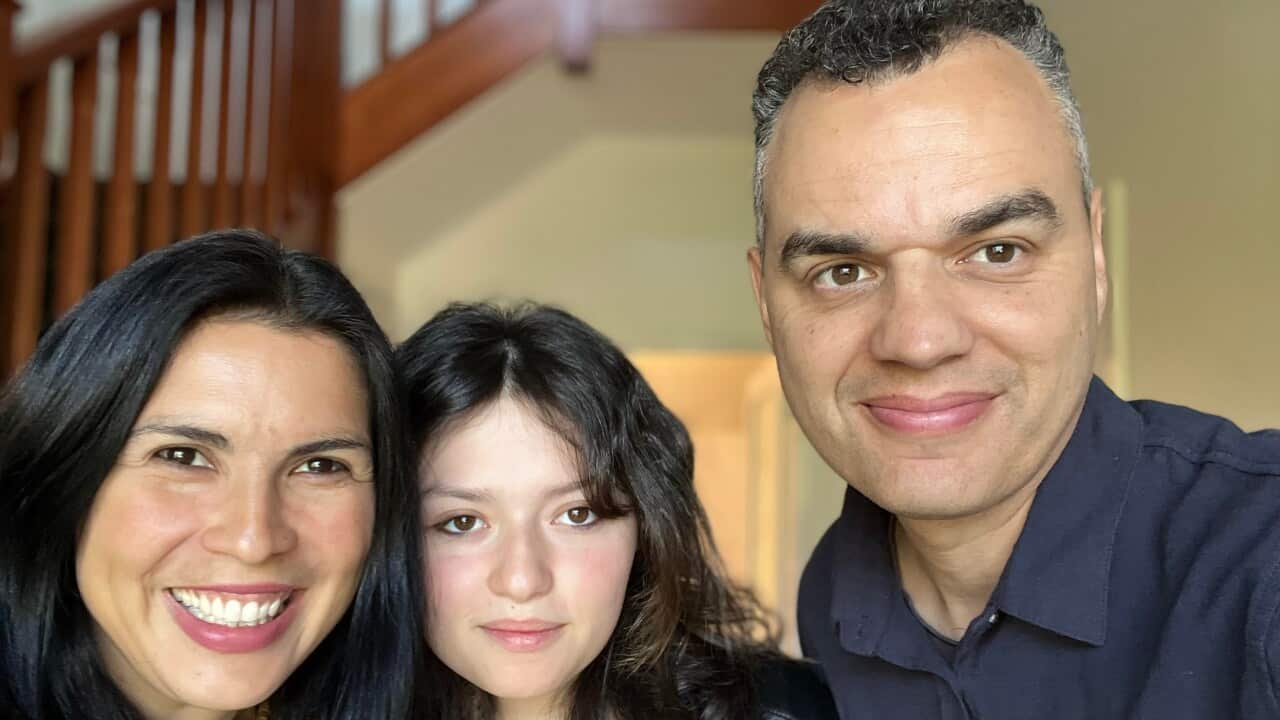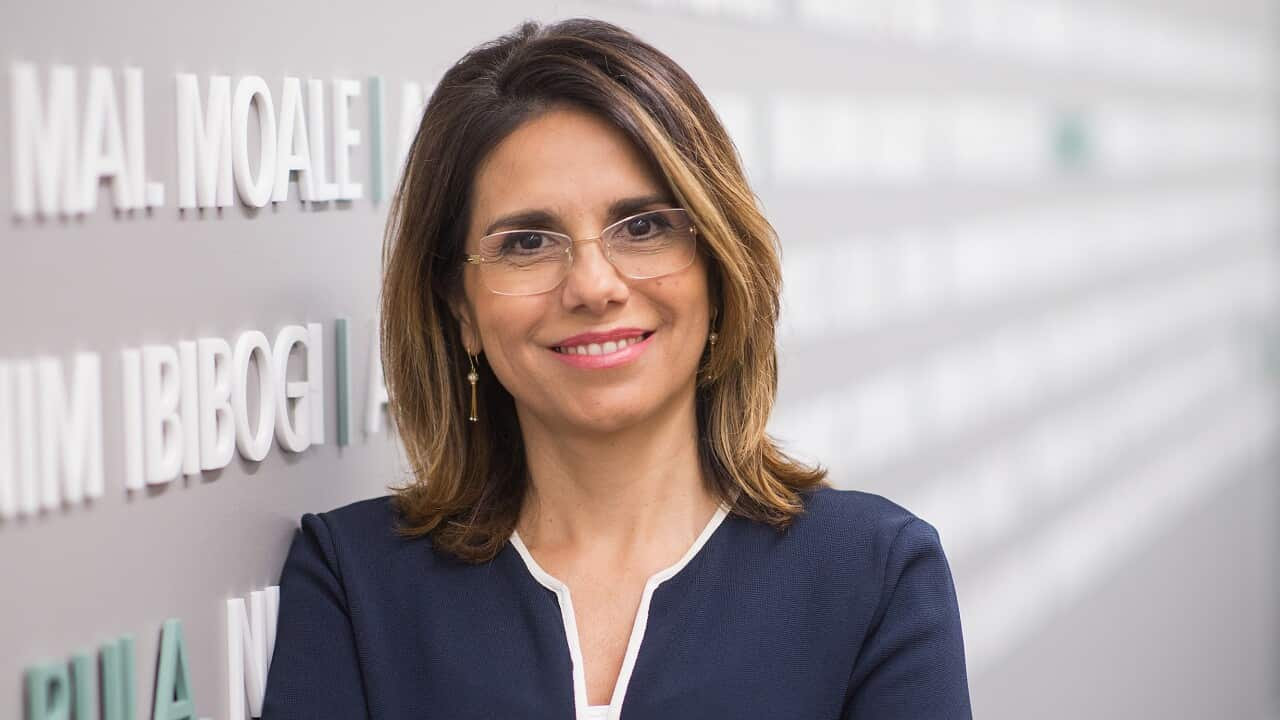Melbourne's long lockdowns of 2020 and 2021 afforded teenager Olivia Dacal time to develop a musical project in another language, Spanish, and surprise her grandfather.
Olivia was born in the United States 17 years ago and very shortly afterwards, her family emigrated to Australia, where they have settled for almost 14 years.
In addition to her parents, Armando and Emily Dacal, Olivia was accompanied by her little sister Lucia. Esther, the youngest member of the family, was born almost seven years later in Australia. But the story of this family really began in Latin America.
But the story of this family really began in Latin America.

The Dacal family of Melbourne. Source: Supplied
Olivia’s maternal grandfather is Mexican and her maternal grandmother is Salvadoran.
Her paternal grandparents were born in Cuba with all of them immigrating to the United States, where they put down roots and watched their respective families grow up.
Spanish at home and English on the street
As with many migrant families, Emily and Armando Dacal grew up listening to and speaking two languages: Spanish at home and English everywhere else.
"In my house growing up, thank God, our parents forced us to speak Spanish," Mr Dacal said.
My father always told me in the house Spanish and English on the street.
Mrs Dacal said she had had a similar experience.
As English gained ground in her life as she grew up, Spanish was reserved for conversations when her parents were present, she said.
Later, when emigrating to Australia, Mr and Mrs Dacal said they could do little to preserve Spanish in their daily lives and although they both spoke it, they communicated most of the time in English.
However, the couple said they always intended to pass on Spanish to their daughters because it was not only an opportunity for development, it was also connection to their culture.
"[Spanish] is the connection to the culture and to knowing who they are. For me it's the most important thing, that they know where they come from and speaking the language is a super important part of this," Mr Dacal said.
Difficulty of learning a language when opportunities to practice it are few
Mrs Dacal told SBS Spanish that she constantly pushed Spanish in conversations with her daughters.
"For me, it is very important that they speak Spanish,” she said.
“I tell them that it is part of us and that one day they will want to know where they come from, who they are and the importance of that. It's also important for them to talk to grandparents, to connect with the stories of our people.” However, despite the extracurricular Spanish lessons and the social activities they occasionally attended with other Spanish-speaking people in Melbourne, the language had failed to take root among the children, she said.
However, despite the extracurricular Spanish lessons and the social activities they occasionally attended with other Spanish-speaking people in Melbourne, the language had failed to take root among the children, she said.

Olivia with her parents. Source: Supplied
"It's been very difficult. There are times that they tell me: 'no, we don't want to speak Spanish anymore',” Mrs Dacal said.
“Then they'll answer me in English, when I speak to them in Spanish but I keep going, I keep pushing for them use the language.”
Confined for almost nine months
The opportunity to integrate Spanish into the daily life of the Dacals was an accidental side-effect of the long lockdowns in Melbourne caused by the COVID-19 pandemic.
"At first we looked at it like everyone else, as an opportunity to connect as a family. I usually travel a lot for work," Mr Dacal said.
Before the pandemic, I was travelling six months a year on average, and with the pandemic I stayed at home, so I was able to spend a lot more time with the girls.
Despite the drawbacks of lockdowns such as a lack of space for work and study, the family embraced with enthusiasm the idea of practicing Spanish at home, now that everyone was together, Mr Dacal said.
"One of the things we did with the girls to continue promoting Spanish was to watch movies or TV shows in the language,” Mr Dacal said.
“We grabbed any chance to speak Spanish, to hear Spanish, and to make that effort to connect them to the culture.”
Guitar tutorials to break the tedium
For Olivia, the lockdown had made her feel trapped, sad and frustrated at not being able to see her friends, she said.
To break the tedium, she said she began learning the guitar through tutorials on YouTube and alone, supported by her knowledge of music and confident in her good "ear" for music.
"I felt very lonely because I couldn't see my friends," Olivia said.
"I also couldn't see my family living in the United States and I felt sad."
To the challenge of learning to play a new instrument by herself, Olivia added the task of practicing her Spanish.
My Spanish is not very good but I like to connect with my culture, although it is difficult because I can't speak it very well.
Days and days of confinement in her bedroom watching guitar tutorials gave her the confidence to undertake her next challenge: she would learn to play and sing her Mexican grandfather's favourite song.
Weeks later, Olivia would surprise her family by singing and playing one of the most emblematic songs of Mexican ranchera music.
“Ella”, by singer-songwriter José Alfredo Jiménez, is Olivia’s grandfather's favourite song and its theme is love, heartbreak and pain that is cured with mariachi music.
After hours of practice, Olivia recorded a video of herself playing the guitar and singing the song.
"When I saw the video, it was very emotional because it was the first time she had ever sung this type of music," Mr Dacal said. Mrs Dacal said she knew that this song would move her father with pride, but she never thought it would make him shed tears.
Mrs Dacal said she knew that this song would move her father with pride, but she never thought it would make him shed tears.

Ms Dacal's grandfather is a fan of mariachi music. Source: Supplied
"With the pandemic we haven't been able to visit family in the United States and I miss them so much," Mrs Dacal said.
So when we called my dad to see Olivia on YouTube we saw him start crying. We had never seen him cry. It was very very moving.
Olivia now studies Spanish on Saturdays at a Melbourne school and also practices with a friend from her school.
For her, exploring this language was an opportunity to be different, to be special, and she hoped that maybe one day this language would help her become a superstar like Selena Quintanilla, the queen of Tex-Mex music, she said.
"I feel very happy to be different, to have Latin American roots although sometimes it is difficult to maintain Spanish because very few people speak it here and I want to practice," Olivia said.
Read and listen to this story in Spanish:

Gracias a la pandemia… descubrí cómo suena mi voz en el idioma de mis abuelos | Ep 4
Other bilingual content:

Meet Asriel, the little boy who learned to speak Spanish from watching cartoons










